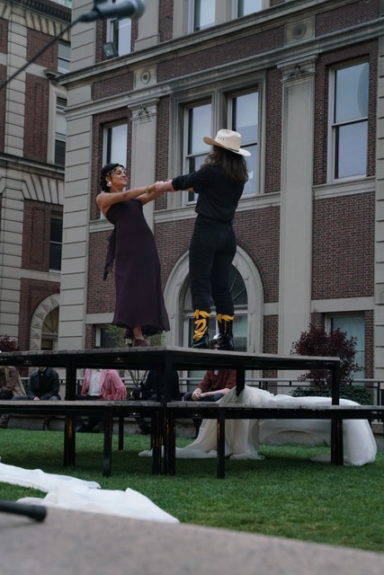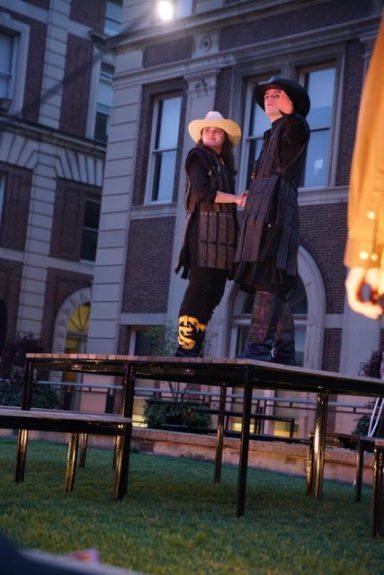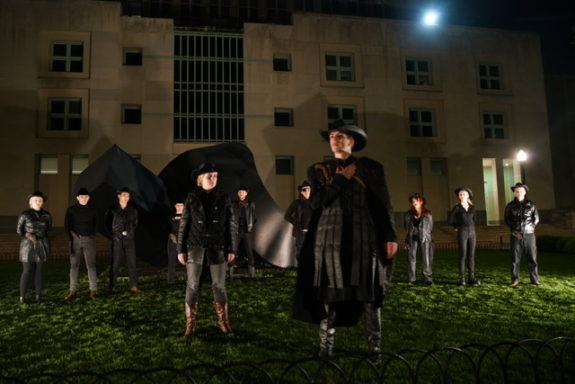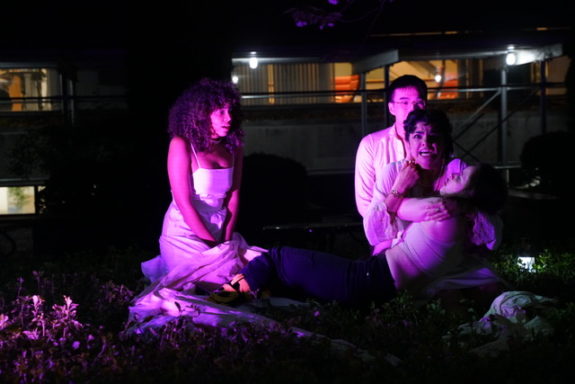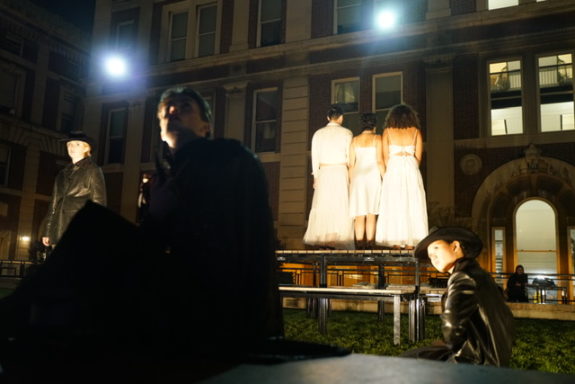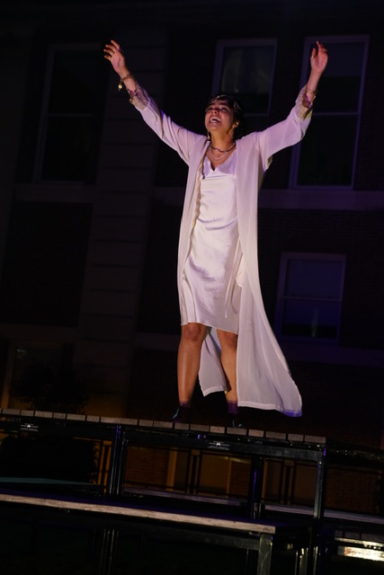On Thursday, April 27, 2023, Staff Writer Maya Reisner attended King’s Crown Shakespeare Troupe’s production of Antony and Cleopatra. The show was produced by Sophie Simons (BC ’25) and Miranda Paiz (BC ’25) and directed by Elsa Hana Chung (CC ’23).
Content warnings: racism, sexism, homophobia, violence, intimacy, death, and suicide.
Columbia’s King’s Crown Shakespeare Troupe (KCST) has worked to bring free Shakespeare productions to campus since its founding in 1995. This year, they brought back their Spring show, presenting the lesser-known Antony and Cleopatra, a dramatic tale of an affair that spanned decades, wars, and two marriages. The play was roaming, taking over three spots on campus as their stage: Revson Plaza, Math Lawn, and Uris Lawn.
Upon finding Revson Plaza, where the show began, I noticed that despite the cold, a sizeable crowd had attended. Groups of friends sat on blankets scattered around, eating snacks and huddling together to beat the cold.
Putting a new spin on the show, there was a significant amount of gender switching in the production: Antony himself was played by Jane Walsh (CC ’23). Director Elsa Hana Chung (CC ‘23) described the show as “a spaghetti western,” featuring the Romans clad in cowboy hats and boots.
At the time the play takes place, Mark Antony, Octavius Caesar (Balint Kidd, CC ‘26), and Aemilius Lepidus (Noah Simon, CC ‘23) rule the Roman Empire as a triumvirate. The play begins with Antony discovering the death of Fulvia, his wife, and rushing to see Cleopatra (Sofia DeSanto, BC ‘24), the woman he has loved and had an affair with over several decades. DeSanto’s Cleopatra interposes fragility and strength, displaying a sensual, influencing role over Antony. The affair with Cleopatra during Antony’s time in Alexandria leads to tension among the three rulers, and Antony is accused of breaking his oath in their alliance. Proving his loyalty to Caesar, Antony marries his sister, Octavia (Anna Kasun, CC’ 24).
The play then moves to Math Lawn, where the walkway splits the scenes occurring between the Romans and Egyptians. Antony finds out Caesar has attacked Pompey (Daniel Shneider, CC ’26) despite the previous peace in the city, and Lepidus is imprisoned. Leaving Octavia in Rome, Antony departs to see Cleopatra in Egypt, where they discover Caesar has waged war on them both due to Antony’s abandonment of his sister. Taking on the role of antagonist in the play, waging war on Caesar in response to his abandonment of their alliance and his own sister, Kidd brings a fierceness to the role, impactfully conveying the character’s rage at his old friend’s betrayal. Commanding the stage with his immense presence and remarkable acting, Caesar is brought to life. The couple opts to fight Caesar by sea, and the audience discovers that he has lost at the beginning of the second act.
After much war and destruction, devastation takes over the plot as the setting shifts to Uris Lawn. Enobarbus (Oliver Fuisz, CC ’26), having switched sides and betrayed Antony during the second war, fought between Caesar and Antony on land, cannot stand his guilt any longer, and takes his own life. Out of fear of Antony’s rage and embarrassment, Cleopatra takes refuge and sends a messenger to tell Antony she has committed suicide in an effort to protect herself. Antony, at the loss of two battles and word of Cleopatra’s supposed death, stabs himself. Walsh’s heartbreaking performance, on her knees, as she describes her misery, was deeply powerful and emotional. She left the audience silent with her striking performance and air of devastation. Charmian (Aidan Ong, CC ‘26), Cleopatra’s closest friend and confidant, then finds him dying and brings him to Cleopatra, where he dies in her arms.
Clutching Antony’s body, DeSanto’s delivery of her lines is haunting. Cleopatra’s despair over the loss of her love tugs at the heartstrings of the audience, making her heartbreak felt throughout. Caesar, conflicted between the death of his former friend and his resolve to take Cleopatra as a Roman prisoner, approaches the Egyptian Queen, threatening her with a terrible fate. Avoiding certain imprisonment, Cleopatra decides to take her own life and die alongside Antony, dressing in her robe and crown before being bitten by an asp and promptly dying. As she crumples to the ground, the devastation in her voice clearly stirs emotion among the audience, who now sits dumbfounded at the dramatic events of the play’s ending. Coming out victorious, Octavius Caesar is left unchallenged in his role as Emperor, standing firmly in his defeat and further ruin of his competitors.
Through the implementation of a roaming set, Antony and Cleopatra truly embodies Shakespeare’s sentiment that ‘all the world’s a stage,” as they presented a heartbreaking tale of love, war, and death across various spots on campus. Most striking was the use of Math lawn, where the walkway separation was used to stage the Roman scenes on one side, and the Egyptians on the other. Creating the feeling of two opposing sides while accentuating that both occur simultaneously, the use of the space enhanced the show’s depiction of two lovers from different worlds, fighting to remain unified in the face of criticism.
Not only was each actor incredible individually, but the chemistry between them and the carefully thought-out direction weaved them together seamlessly, imposing real, emotional, reactions among the viewers. Antony and Cleopatra’s interactions leave not only their love but also the tension between them palpable. Rather than two actors portraying their characters, watching Walsh and DeSanto feels like watching a couple in real life, sensing the love and friction in their affection and quarreling.
The synthesis of the clever use of space, remarkable acting, and palpable emotion fostered a play so powerful that it made spending three hours in the cold worthwhile. Despite being based on an affair that occurred roughly during 40-30 B.C., the play spoke to its audience, connecting with anyone who has been through tumultuous relationships with lovers and friends. All in all, this performance was thoroughly enjoyable and impactful, even to someone like me who resented having to read Shakespeare in English class.
Moments from “Antony and Cleopatra” taken and gifted by the incredibly talented Olivia Kuan-Romano


 0 Comments
0 Comments